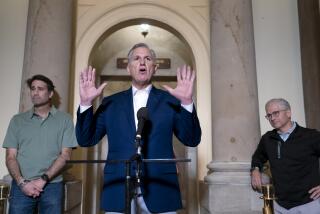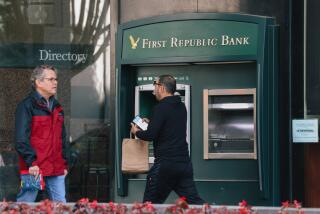Plan Called ‘Workable Compromise’ : Legislators Devise $8.5-Billion FSLIC Bailout
- Share via
WASHINGTON — House and Senate negotiators approved legislation Wednesday that would allow the insolvent Federal Savings & Loan Insurance Corp. to borrow $8.5 billion to try to rescue the thrift industry from bankruptcy.
However, Sen. Jake Garn (R-Utah), the ranking Republican on the Senate Banking Committee, said he still believes that the bill might be vetoed by President Reagan because the White House had proposed a $15-billion bailout.
The measure now goes back to the House and Senate for final approval before being sent to the White House.
Earlier, the House had passed legislation giving FSLIC borrowing authority of $5 billion. The Senate’s version, in a comprehensive banking measure, would have allowed $7.5 billion.
“The agreements reached in this conference provide a solid base on which the federal regulators can deal with short-range emergencies in the financial community and guidelines for the Congress in hammering out longer-range solutions to public interest regulation of institutions insured by the government,” said Rep. Fernand J. St Germain (D-R.I.), chairman of the House banking committee and chairman of the negotiators.
“The conference agreement on FSLIC is a workable compromise that will allow FSLIC to deal effectively with the terminally ill institutions,” he said.
However, Rep. Jim Leach (R-Iowa), a member of the conference committee, said: “Confronted with an industry that is undercapitalized, under-regulated and overextended, I fear the bill is too little, too lax and too late.”
But Joe C. Morris, chairman of the U.S. League of Savings Institutions, said in a statement that the FSLIC recapitalization plan gives the industry “sufficient money to resolve its problems and maintain its strength in the future.”
“The $8.5-billion infusion from the savings institutions business--at no cost to the taxpayers--provides a major strengthening of the FSLIC.”
The House and Senate banking committee members also agreed to close the legal loophole that permitted the creation of so-called non-bank banks--institutions that offer checking accounts or make commercial loans, but not both. The agreement will ban non-bank banks formed after March 5 of this year.
Such loophole banks are not covered by federal limits on who can own banks and where banks can operate. The conferees decided to change the legal definition of a bank to include any institution that offers either of the two banking services, bringing the non-banks banks under federal law.
The conferees also agreed to impose a nine-month freeze on banks’ expansion into the securities and insurance industries.
More to Read
Get the L.A. Times Politics newsletter
Deeply reported insights into legislation, politics and policy from Sacramento, Washington and beyond. In your inbox twice per week.
You may occasionally receive promotional content from the Los Angeles Times.










